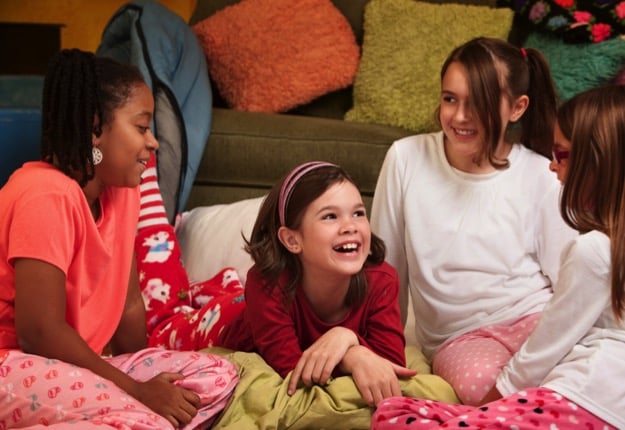For some children, the thought of an overnight sleepover can be the cause of so much anxiety, they avoid them altogether.
Give your child a strategy – a plan – and practise it at home before the sleepover.
Sleepovers and camps, which are important for a child’s social and emotional development, should be a fun and exciting time – even for children who still wet the bed.
Clinical psychologist Chris Hardwick, who has worked at Sydney’s Westmead Children’s Hospital with children and families affected by bed wetting, offers these two practical suggestions to help prepare at-risk children for overnight sleepovers:
1) Problem solve possible scenarios beforehand.
Talk and think through with your child all that could happen and problem solve what to do if the worst scenario takes place. Give your child a strategy – a plan – and practise it at home before the sleepover.
For example, will your child need a change of underpants, pyjamas or pull-ups? Where is the best place to keep them, to get changed, and where can they hide or dispose of wet items?
When children have a well thought out plan, they will be much less anxious about sleeping over and more confident they will be able to manage.
2) Have a support person at the other end.
If there’s an adult at the other end that can be made aware of the situation, and the child is okay with their knowing, recruit that adult as a support person.
If the child knows there’s a trusted person like a teacher, an aunty or a friend’s mother to whom they can quietly go if they need to, that will make them feel less anxious.
The child may be fairly confident about coping, in which case a support person may not be necessary. However, if they’re unsure about handling certain scenarios, it’s best to recruit a support person.
Handy hints
- Sleeping bags can be discreetly lined with bed pads, while pull-ups, zip-lock bags and spare pyjamas can be tucked in the bottom of the sleeping bag.
- By setting an alarm clock earlier than others, your child can get up and dispose of, or pack away, any products.
- Ensure your child has a torch or night light so they can go to the toilet one last time before falling asleep, particularly if the children stay awake and talk for a long time.
- Ask your child to decline any hot chocolate drinks that are offered for supper.
- Wipes are great for reducing body smells, and zip-lock bags are great for hiding odour.
- Pack identical pairs of pyjamas.
- Consider administering bed wetting medication for the duration of the sleepover.
Did you know?
- More than one in five Australian children still wet the bed occasionally, and more than 100,000 children will wet the bed tonight.
- Most children will be dry at night by school age.
- Not all children “grow out” of bed wetting, and if your child is still wetting the bed at age 7, it’s important to seek professional help.
- If your child has been dry at night, and suddenly starts bed wetting, seek professional help.
For confidential advice and support about your child’s bed wetting or any other continence issues, phone the National Continence Helpline (1800 33 00 66), which is staffed by continence nurse advisors from 8am to 8pm weekdays.
The Continence Foundation of Australia is the peak national organisation working to improve the quality of life of all Australians affected by incontinence. For more information, go to continence.org.au




















7:50 am
10:16 pm
7:48 am
4:52 pm
11:43 pm
2:11 pm
-

-
-
mom94125 replied
- 18 Oct 2015 , 5:31 pm
Reply6:49 am
2:14 pm
11:30 am
3:23 pm
10:41 am
8:49 am
2:23 pm
11:15 pm
6:52 pm
9:52 pm
1:10 pm
6:51 pm
-

-
-
mom88528 replied
- 13 Jan 2015 , 9:12 am
Reply1:44 pm
8:47 pm
- 1
- 2
- 3
- »
Post a commentTo post a review/comment please join us or login so we can allocate your points.